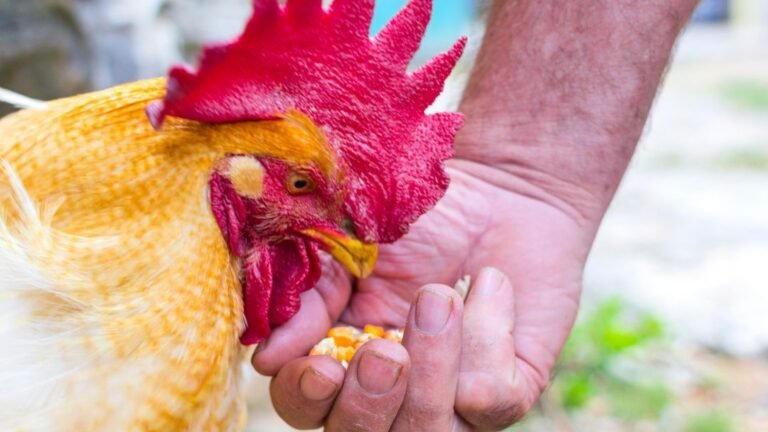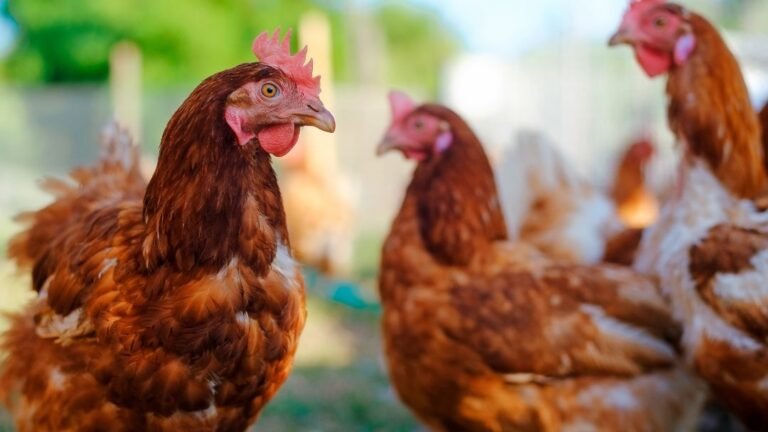Yes, chickens can eat strawberries, but in moderation. However, there are certain foods to avoid feeding them.
We will discuss whether chickens can eat strawberries and highlight some other foods to keep away from them. Chickens are known for their love of scratching and foraging, not only for grains and insects but also for fruits and vegetables.
Many chicken owners wonder if it’s safe to include strawberries in their chickens’ diet. The good news is that strawberries are not toxic to chickens and can be enjoyed by them as an occasional treat. However, it’s important to feed them strawberries in moderation due to their high sugar content, which can cause digestive issues if consumed excessively. While it’s generally safe, there are other foods that chickens should avoid, as they can be harmful to their health. Let’s take a closer look at what else we should avoid feeding our feathered friends.
The Nutritional Benefits Of Strawberries For Chickens
Strawberries are not only a delicious treat for humans but can also be enjoyed by our feathered friends – chickens! These juicy berries are packed with essential vitamins and minerals, making them a nutritious addition to a chicken’s diet. However, like any other food, strawberries should be given to chickens in moderation and with a varied diet to ensure overall nutritional balance.
Vitamins And Minerals Found In Strawberries
Strawberries are a powerhouse of nutrients that can benefit chickens in various ways. Let’s take a closer look at the vitamins and minerals found in these delightful berries:
| Nutrients | Benefits for Chickens |
|---|---|
| Vitamin C | Promotes a strong immune system and helps in collagen synthesis for healthy skin and feathers. |
| Vitamin K | Aids in blood clotting and supports overall bone health in chickens. |
| Folate | Essential for proper cell growth and development, especially during periods of rapid growth like hatchlings and molting. |
| Potassium | Helps regulate fluid balance, nerve function, and muscle contractions in chickens. |
| Manganese | Required for enzyme function, metabolism, and proper bone development in chickens. |
How Strawberries Can Contribute To A Balanced Chicken Diet
When incorporated into a balanced diet, strawberries can provide additional nutritional benefits to chickens. Including strawberries can enhance the overall dietary profile, but it’s important to remember that they should not be the sole source of nutrition. A balanced chicken diet should consist of a variety of grains, proteins, vegetables, and fruits.
Here are a few ways strawberries can contribute to a balanced chicken diet:
- Added Antioxidants: Strawberries contain antioxidants, such as vitamin C, that can help combat free radicals and protect the chickens’ cells from oxidative stress.
- Natural Flavor and Variety: Adding strawberries to the chicken’s diet provides a natural burst of flavor and introduces variety, preventing the diet from becoming monotonous.
- Texture and Enrichment: The texture of strawberries can provide enrichment to chickens, as they enjoy pecking and exploring new foods. It also helps in maintaining beak health.
The Importance Of Moderation And Variety In Chicken Nutrition
While strawberries offer several nutritional benefits, it’s crucial to practice moderation and ensure dietary variety for the overall well-being of chickens. In an optimal diet, strawberries should make up only a portion of the total food intake. Feeding chickens excessive amounts of strawberries can lead to an imbalance in their nutritional intake or even digestive issues.
Remember to introduce a range of other foods like leafy greens, grains, and high-quality poultry feeds to provide a balanced diet. This approach promotes optimal growth, boosts egg production, and supports healthy feather development in chickens.
Potential Risks Of Feeding Strawberries To Chickens
htmlOxalates And Their Effects On Chicken Health
Feeding strawberries to chickens in moderation is generally safe and can provide them with added nutrients. However, it’s essential to be aware of potential risks, such as oxalates that are naturally present in strawberries. Oxalates are organic compounds that can hinder calcium absorption and contribute to the formation of kidney stones in some animals, including chickens.
Allergies And Sensitivities In Chickens
Just like humans, chickens can also have allergies or sensitivities to certain foods, including strawberries. While rare, some chickens may experience allergic reactions or digestive issues when consuming strawberries. It is crucial to observe your flock closely after introducing strawberries into their diet and consult with a veterinarian if any adverse reactions occur.
The Importance Of Avoiding Moldy Or Spoiled Strawberries
When offering strawberries to chickens, it is important to ensure that the berries are fresh and in good condition. Moldy or spoiled strawberries can pose health risks to chickens and should be avoided altogether. Mold can produce mycotoxins that are harmful to chickens and can lead to various health problems. Always discard any strawberries that show signs of mold or spoilage to keep your feathered friends safe and healthy.
Strawberries can be a tasty and nutritious treat for chickens, but it’s crucial to be mindful of potential risks. Oxalates present in strawberries can hinder calcium absorption and contribute to kidney stone formation in some chickens. Additionally, chickens can have allergies or sensitivities to strawberries, and it’s important to monitor their reactions. Lastly, always ensure that the strawberries given to chickens are fresh and free from mold or spoilage to avoid potential health problems.
Safe Ways To Feed Strawberries To Chickens
Strawberries are a delicious and nutritious fruit that many of us enjoy. But can chickens eat strawberries? The answer is yes! In fact, strawberries can be a healthy addition to your chickens’ diet when prepared and served correctly. In this article, we’ll explore the safe ways to feed strawberries to chickens, including proper preparation and serving suggestions, creating a balanced diet incorporating strawberries, and monitoring for any adverse reactions or changes in behavior.
Proper Preparation And Serving Suggestions
When feeding strawberries to your chickens, there are a few important steps to take to ensure their safety and enjoyment. Here are some tips:
- Wash the strawberries thoroughly to remove any dirt or pesticides.
- Remove the green tops as chickens may find them difficult to eat.
- Chop the strawberries into small, bite-sized pieces to make them easier for chickens to consume.
- Consider mixing the strawberries with their regular feed or other treats to provide variety and encourage them to eat the fruit.
By following these preparation and serving suggestions, you can offer your chickens a safe and enjoyable strawberry treat.
Creating A Balanced Diet Incorporating Strawberries
While strawberries can be a healthy addition to your chickens’ diet, it’s important to remember that they should not make up the majority of their food intake. Chickens require a well-balanced diet that includes a variety of nutrients to thrive. Here are some tips for incorporating strawberries into their diet:
- Offer strawberries as a treat or supplement to their regular feed rather than replacing it entirely.
- Ensure that their main diet consists of balanced chicken feed that is specifically formulated for their nutritional needs.
- Include a mix of other fruits, vegetables, and grains to provide a diverse range of nutrients.
Remember, moderation is key when it comes to feeding strawberries to chickens. By creating a balanced diet that includes a variety of foods, including strawberries, you can help ensure your chickens’ overall health and well-being.
Monitoring For Any Adverse Reactions Or Changes In Behavior
While strawberries are generally safe for chickens to eat, it’s always important to monitor their reactions and behavior after introducing any new food. Some chickens may have sensitivities or allergies to certain fruits, including strawberries. Keep an eye out for any adverse reactions, such as digestive upsets or changes in behavior.
If you notice any concerning symptoms or behavioral changes after feeding strawberries, it’s best to consult a veterinarian to rule out any potential issues. Every chicken is different, and it’s essential to pay attention to their individual needs and preferences.
In conclusion, yes, chickens can eat strawberries, as long as they are properly prepared and served. By following the proper preparation and serving suggestions, creating a balanced diet, and monitoring for any adverse reactions or changes in behavior, you can safely incorporate strawberries into your chickens’ diet. Just remember, moderation is key, and always prioritize your chickens’ overall well-being.</p
Other Fruits And Vegetables To Avoid Feeding Chickens
Toxic Fruits And Vegetables For Chickens
While chickens enjoy a varied diet, not all fruits and vegetables are safe for them to consume. In fact, some can be toxic and even fatal to these feathered friends. It’s essential for chicken owners to be aware of which foods to avoid feeding their flock to ensure their health and well-being.
Common Foods That Can Pose Risks To Chicken Health
It’s important to be cautious when offering your chickens any new foods. Some seemingly harmless fruits and vegetables can actually be harmful to their health. Here are a few examples of common foods to avoid feeding chickens:
- Grapes: While grapes are a delicious treat for humans, they should be avoided when it comes to chickens. These fruits contain compounds that can be toxic to their system and lead to kidney failure.
- Avocado: Avocado, while enjoyed by many, is highly toxic to chickens. It contains a substance called persin, which can cause gastric distress, difficulty breathing, and even death in these birds.
- Onions and garlic: Onions and garlic, although flavorful in our dishes, are toxic to chickens. They contain compounds that can damage their red blood cells and lead to anemia.
Alternatives To Strawberries That Provide Similar Nutritional Benefits
If strawberries are not an option for your chickens, there are plenty of other fruits and vegetables that provide similar nutritional benefits. Here are a few alternatives to strawberries that you can safely offer your flock:
| Fruit/Vegetable | Nutritional Benefits |
|---|---|
| Blueberries | Rich in antioxidants and vitamins, blueberries can boost your chickens’ immune system and promote overall health. |
| Watermelon | A hydrating treat for chickens, watermelon is a great source of vitamins A and C, as well as potassium. |
| Pumpkin | Not only is pumpkin a tasty treat, but it’s also packed with vitamins and minerals that can support healthy digestion and feather growth. |
Remember, when introducing any new fruits or vegetables to your flock, start with small amounts and monitor their response. Some chickens may have individual sensitivities or allergies, so it’s always best to observe their reactions and adjust accordingly. By providing a balanced and safe diet, you can keep your chickens happy and healthy.
Conclusion
To sum up, chickens can indeed eat strawberries as part of a diverse and balanced diet. Strawberries provide a tasty treat for our feathered friends and are loaded with essential vitamins and minerals. However, it’s crucial to avoid feeding them too many strawberries or any parts of the fruit that are spoiled or contaminated.
Always prioritize the health and safety of your flock by offering strawberries as an occasional treat. Happy chicken keeping!


